Buffalo, biodiversity, and breaking barriers
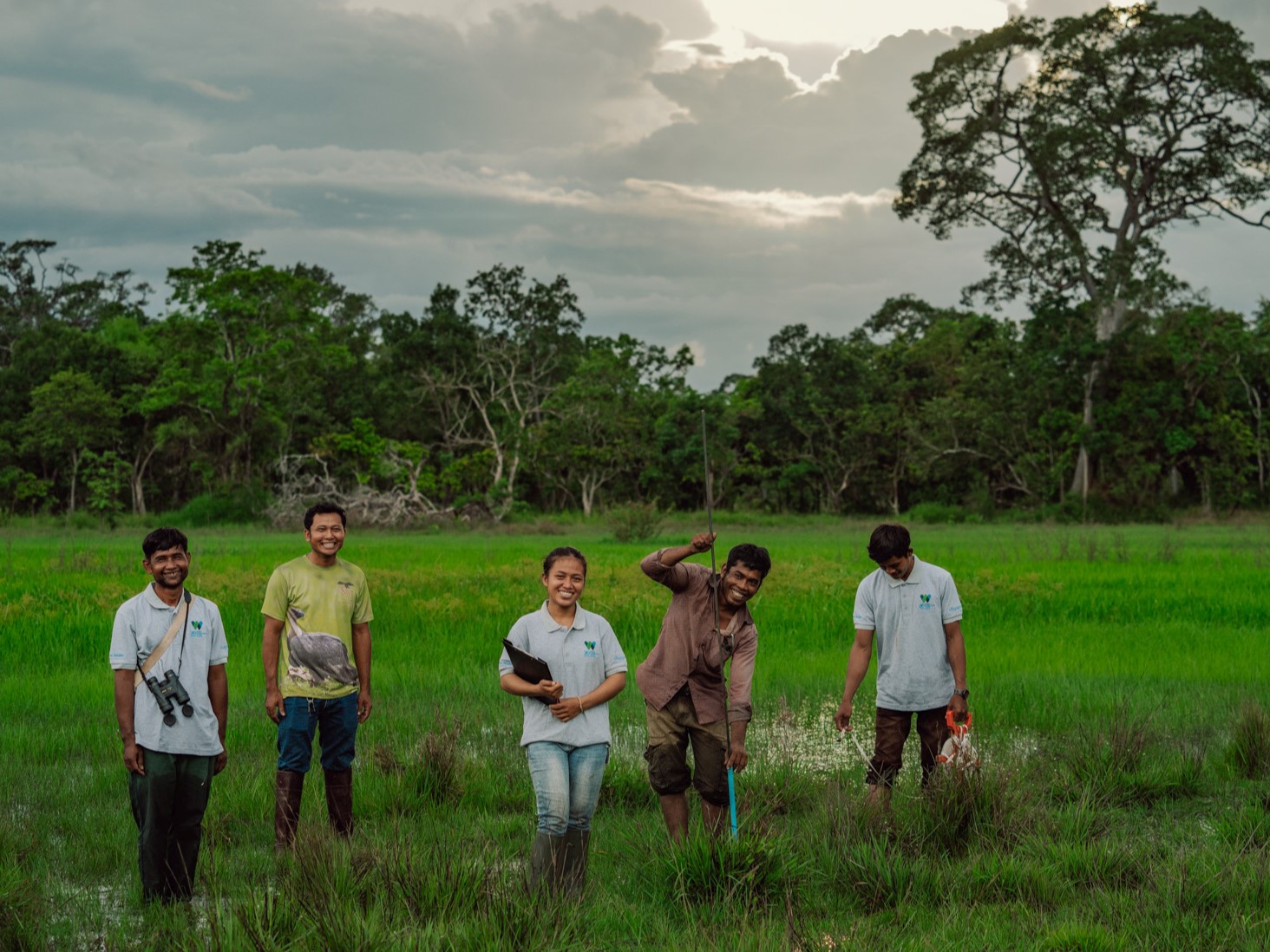
Biodiversity Research Assistant Bunlet Leaktra (middle) training local community members on seasonal pond monitoring. Credit - Everland.
Buffalo, biodiversity, and breaking barriers: How Cambodia’s women are reshaping conservation
For 25 years, Wildlife Conservation Society (WCS) has worked to make conservation inclusive, ensuring that communities, especially women, are central to Cambodia’s sustainability and environmental preservation efforts. WCS is partnering with local communities and women in the Northern Plains Landscape to restore seasonal ponds by introducing domesticated water buffalo, whose grazing and wallowing help maintain these ponds. This initiative was also designed to support women and their families by providing buffalo for milk production, and the sale of dairy products - creating sustainable income that reduces poverty, diversifies livelihoods, and finances long-term community patrols.
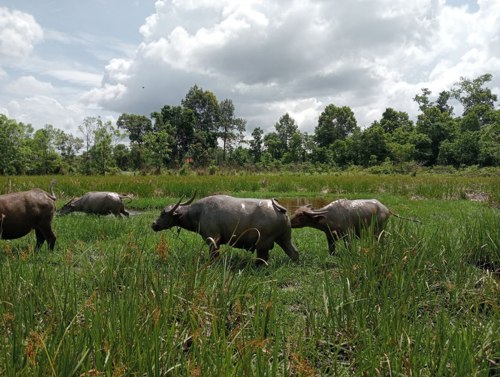
Northern Plains Landscape is among Southeast Asia’s richest biodiversity areas, home to more than 350 bird species and 82 species listed as threatened by the IUCN. This landscape blends community livelihoods, subsistence farming, cultural sites, and protected areas, with more than 700 seasonal ponds identified by community biodiversity researchers. These temporary waterbodies are critical for species such as the White-shouldered ibis, Giant ibis, and banteng.
Despite ongoing conservation efforts, these ponds are increasingly threatened by habitat degradation, declining herbivore populations, infrastructure development, expanding agriculture, and climate change. In the Northern Plains Landscape, WCS and the Provincial Department of Environment have worked with community members (many of them women) to restore 9 seasonal ponds frequently visited by buffalo while monitoring 17 additional ponds.
Early results indicate that seasonal ponds where buffalo were introduced retained water longer, delaying the drying process. This increased water availability provides essential foraging resources for key bird species during dry periods.
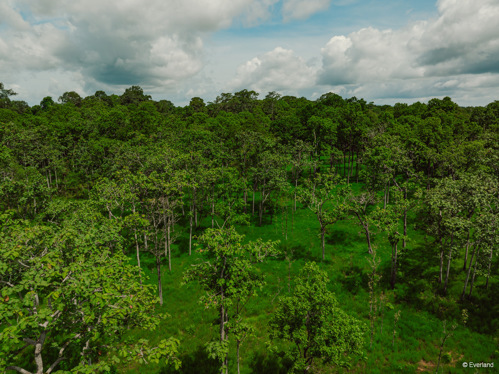 Northern Plains landscape forest. Credit - Everland.
Northern Plains landscape forest. Credit - Everland.
Women stepping up to protect Cambodia’s seasonal ponds and wildlife
To enhance women’s involvement, WCS established a monitoring protocol and provided monthly training for six women while engaging men in the process. One challenge was low literacy levels in the project villages, which affected data collection and communication. To address this, WCS adapted data collection methods using KoboCollect forms incorporating voice messages and written content in Khmer and English, making the process more accessible.
Conservation fieldwork remains male-dominated, but WCS is committed to ensuring that all individuals, regardless of gender, can engage and benefit from our conservation efforts. In three of the four Community Protected Areas (CPAs), women comprise half of the seasonal pond monitoring teams - a key step toward greater inclusion. Among them is Bunlet Leaktra, who joined WCS as a Biodiversity Research Assistant in 2022 and has since played a crucial role in training community members within the Mlu Prey Keub CPA.
“I was only 19 when I started, and I felt I lacked the skills to lead a team and collect data effectively. Conservation in Cambodia is male-dominated, which made me hesitant. But I took on this challenge because I believe women and men are vital in conservation. I hope to inspire young women in Mlu Prey Keub CPA to engage in biodiversity.”
Another key team member is Hang Meta, who has worked as a Community Liaison Officer since 2020. She has worked closely with Mlu Prey Keub CPA members throughout this project, assisting with buffalo herd management and project planning.
 Giant Ibis, Cambodia's national bird. Credit - Everland.
Giant Ibis, Cambodia's national bird. Credit - Everland.
Buffalo, dairy, and a pathway to economic independence
A major milestone of the project has been integrating women into buffalo husbandry, yogurt production, and sales - strengthened through international exchange trips with the Laos Buffalo Dairy. Chay Salin, a community member from Prey Veng CPA, shares her experience:
“The income we generate from selling buffaloes and yogurt is saved in the community ledger for future CPA needs, such as forest patrols and buffalo herd care. During exchange trips, I learned about the health benefits of buffalo dairy for children and vulnerable people. The project has strengthened the local economy and helped my family afford my younger sister's education. I am grateful to WCS and the Darwin Initiative for allowing me to contribute to conservation in my village.”
Although many women contribute to this project, societal norms often position men as the primary decision-makers. To promote greater equity, WCS involved husband-and-wife teams in the Bird Nest Protection Programme, ensuring both partners signed contracts and shared responsibility for protecting key bird species. In Prey Veng CPA, two couples successfully protected Giant ibis and Sarus crane nests, two of Cambodia’s most iconic and threatened birds.
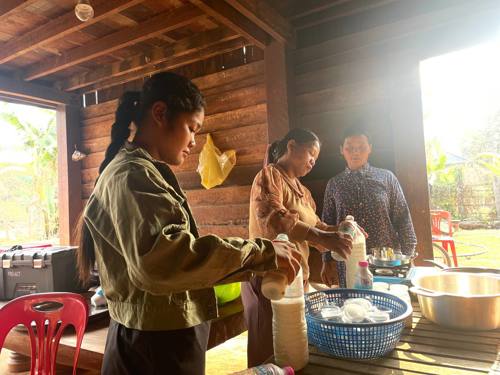
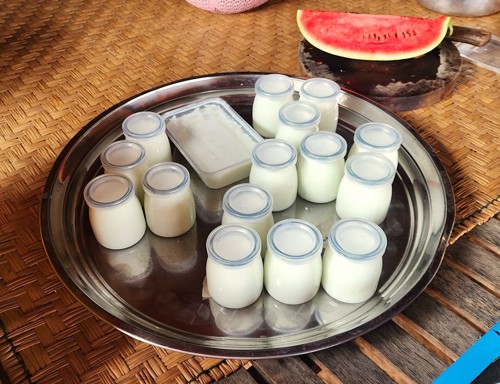
A conservation future led by communities, strengthened by women
WCS believes that conservation succeeds when entire communities are involved, which means breaking barriers that have long excluded women. Work in the Northern Plains Landscape is proving that when women take the lead in monitoring, husbandry, and conservation, ecosystems and livelihoods improve. With more women stepping into these roles, the future of Cambodia’s biodiversity looks stronger, and more equitable, than ever.
Written by Emeline Auda & Chhat Sophim, Northern Plains Landscape. For more information on this Darwin Initiative Main project 30-022, led by WCS, please click here.
 Back
Back